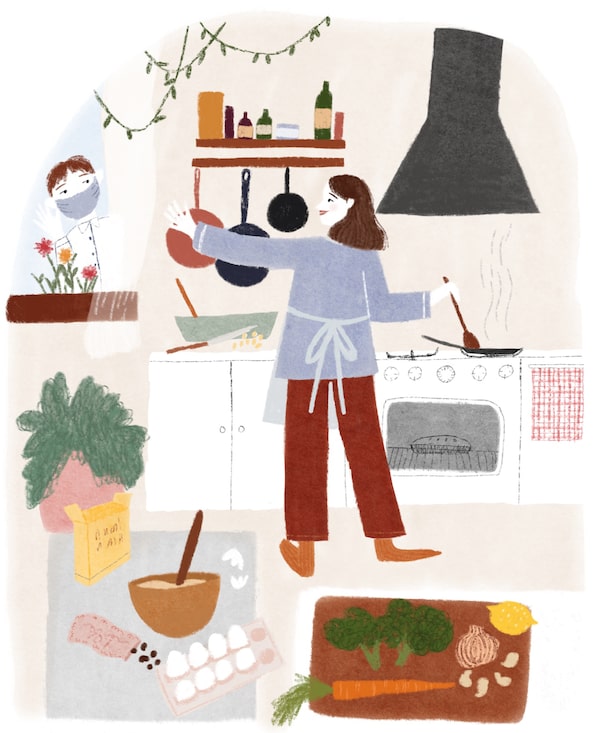
Illustration by Chelsea O'Byrne
First Person is a daily personal piece submitted by readers. Have a story to tell? See our guidelines at tgam.ca/essayguide.
I was born with the adage “food is love” in my DNA. There are a long line of balabustas, the Yiddish expression of good homemakers, who made tasty meals and delectable baked goods for every day and every occasion in my family.
Now, in this global pandemic, the symbolism has never been more powerful. My work with vulnerable seniors has been curtailed for the immediate future. For now, I am the CEO of our family kitchen. I have always been senior management in this department but with this new world disorder, I have received an unspoken promotion.
Every day now, my agenda is clear. It seems important to make an inviting dinner every night. This is the centrepiece of our day. The inquiries begin midmorning when my young-adult sons (home from senior year of high school and from senior year of an undergraduate thesis) sidle into the kitchen like wary cats to cautiously explore the fridge terrain. They ask what is for dinner, with three-quarters of their bodies submerged in the cool shelves. When I answer “shrimp risotto” or “shepherd’s pie” or “pork chops,” complete with Hello Dolly squares or chocolate cake or shortbread cookies, they will turn and glide over to me, again like cats, and gently, affectionately nudge me and purr their approval.
My husband will call home from his essential work around 4 p.m. asking what is up for the evening. He has already been home for lunch, heating up leftover rice and chicken from last night’s meal to get a break from the near empty office and the heavy silence of not enough phones ringing. His daily, late-afternoon call (“Hi Honey, what’s up for the evening?”) is an almost-25-years-of-marriage code that means, “What are you making for dinner?” In the new not-normal, the question carries even greater import. I know he is asking, what are you doing to hold down the fort? He knows he can trust me to be at the ready with Dan Dan noodles or fried rice with tofu and kimchi.
Some days, before these days, I have felt that my dinner contributions have, at times, been taken for granted. Definitely not now. He and the kids are very vocal in their appreciation. We sit together at the kitchen table and talk, really talk, over platters of food, with comforting steam rising up.
My daughter was brought home by the pandemic from a semester abroad, quarantined in the basement of her travel friend and fellow student. In the tense, hurried rush before she landed in Toronto, I asked her if she wanted me to bake chocolate chip cookies or banana bread – in our family these are both mainstays of comfort and normalcy. We rushed to gather bags of groceries and bring her banana bread to the back door of her home away from home. She sends us pictures of her meals away from us; her vegan bowls and avocado toasts have been a kind of comfort. They say she is still herself though she is not with us yet. We carefully set aside frozen edamame, and save our most favourite veggie meals to make when she is with us again.
My husband and I have slowly gathered, careful not to hog or stockpile, canned soup, tins of tuna, a few sweet potatoes and apples. These supplies now live in a cool dark storage area in the basement we have begun to call our “COVID pantry.” It is a modest and motley collection of goods that makes us feel just a little bit calmer. I find myself visiting this little corner, breathing in the distantly sweet smell of the apples.
No one who works from home, paid or not, will be surprised by how busy and distracting the management of the kitchen can be during social isolation. There are nourishing and economical vegetable soups to be assembled, new rice recipes to research and long-ago nostalgic casseroles to recreate. Using our starches, proteins, vegetables and fruits wisely is a bit of a puzzle. My goal is to stretch supplies while nourishing and uplifting. The other day I found myself questioning the morality – the morality! – of using legumes and meat together in one dish.
I miss my work. My other outside-the-kitchen work. Reminiscing makes me realize how often food’s ability to connect and nourish us, both physically and emotionally, comes into play. Many of my most engaging memories concern conversations with seniors and colleagues around food. Sharing snacks and lunches together created greater intimacy and expanded our knowledge of each other. What kind of meals and beverages we enjoy, even crave for comfort and celebration, are sign posts in the journey to draw us nearer to each other. It is why now, in isolation, I will FaceTime friends and family, asking them what they are eating. I so enjoy hearing about their chilis, muffins and stews. It is why I find myself thoughtfully mulling and then making meals of connection for my loved ones, confined to home.
I have only scratched the surface of the meaty subject of food offering a loving message. It is a rich multilayered subject that I will continue to consider, because it both distracts and motivates me. I’ll be in the kitchen if anyone is asking.
Robin Gertin lives in Toronto.